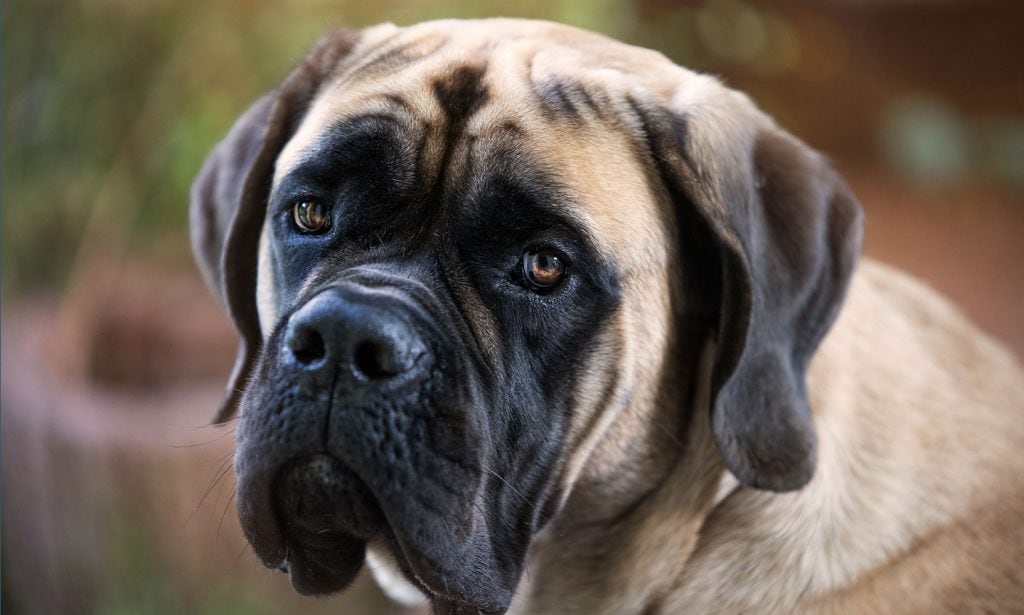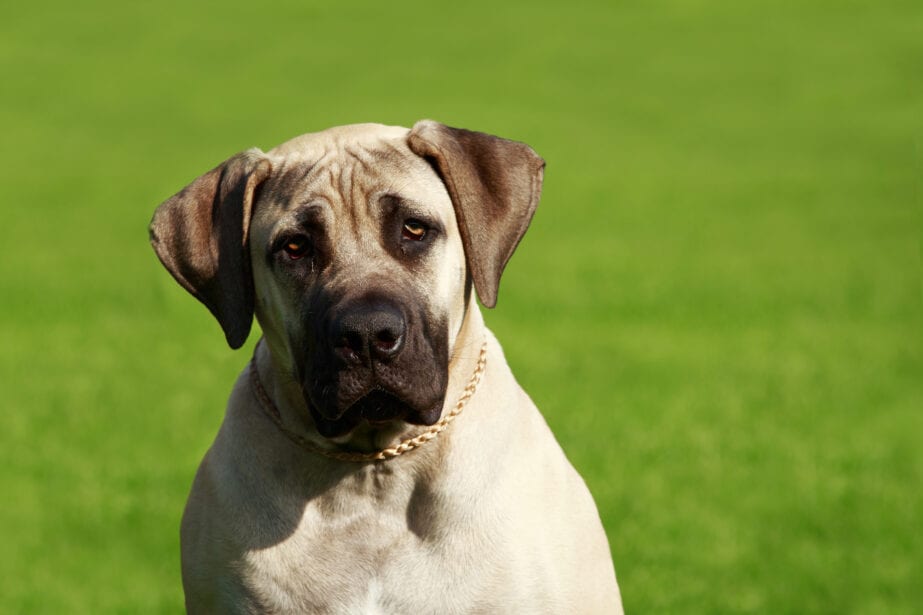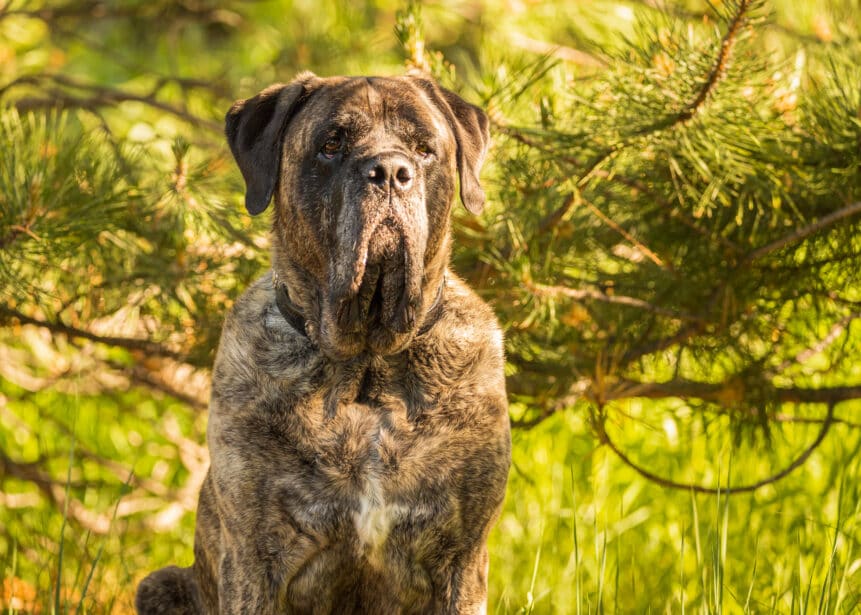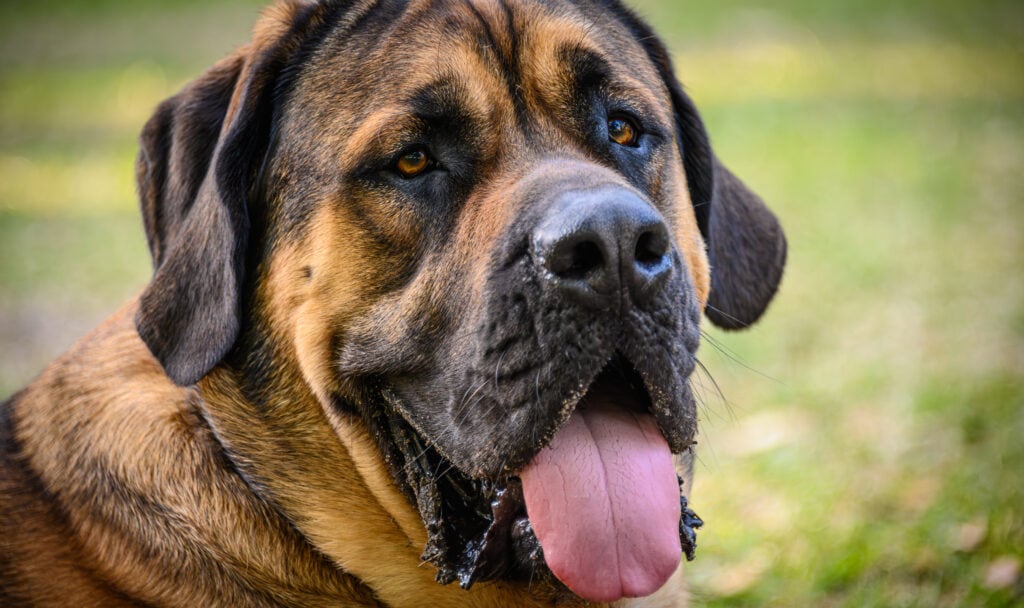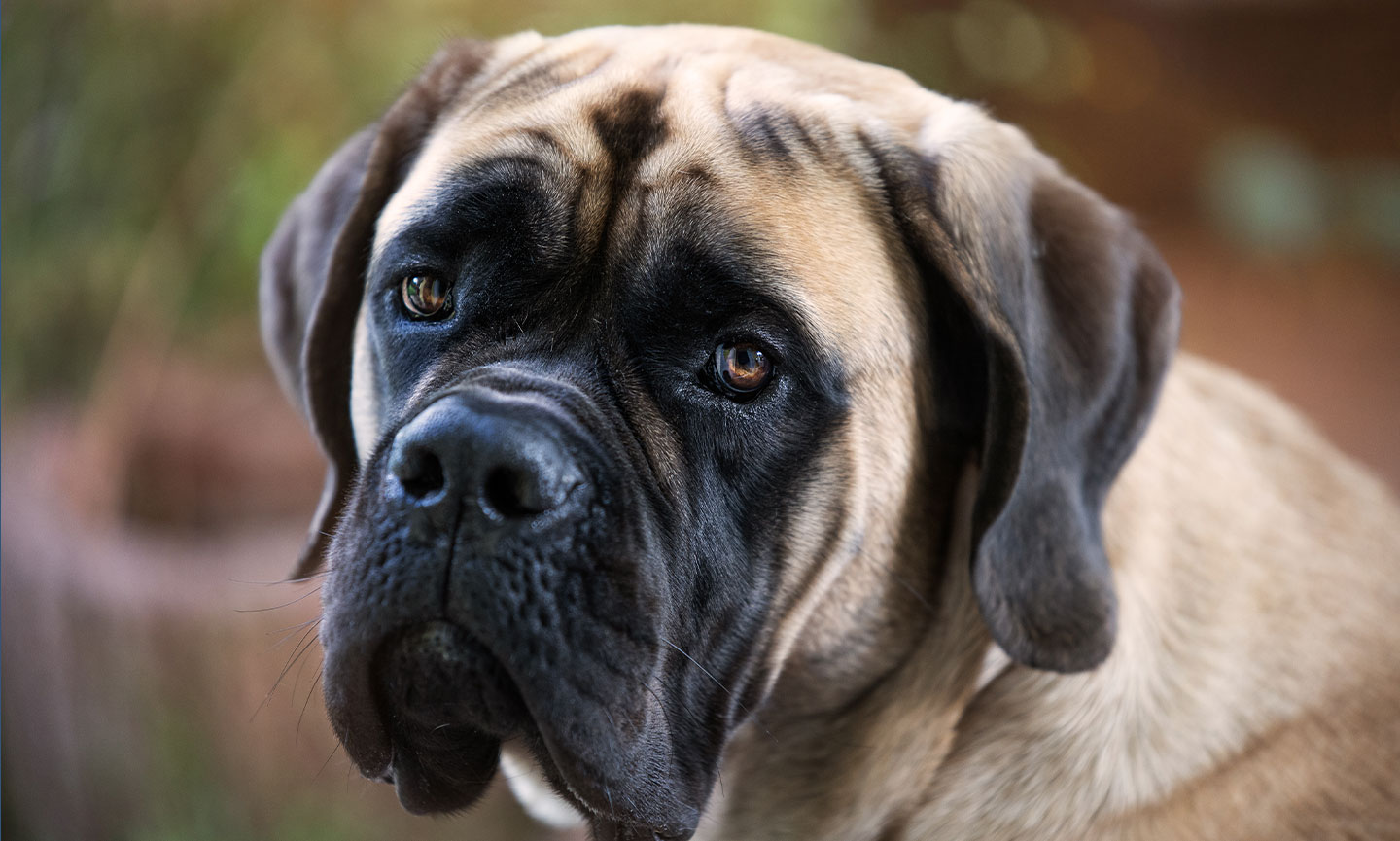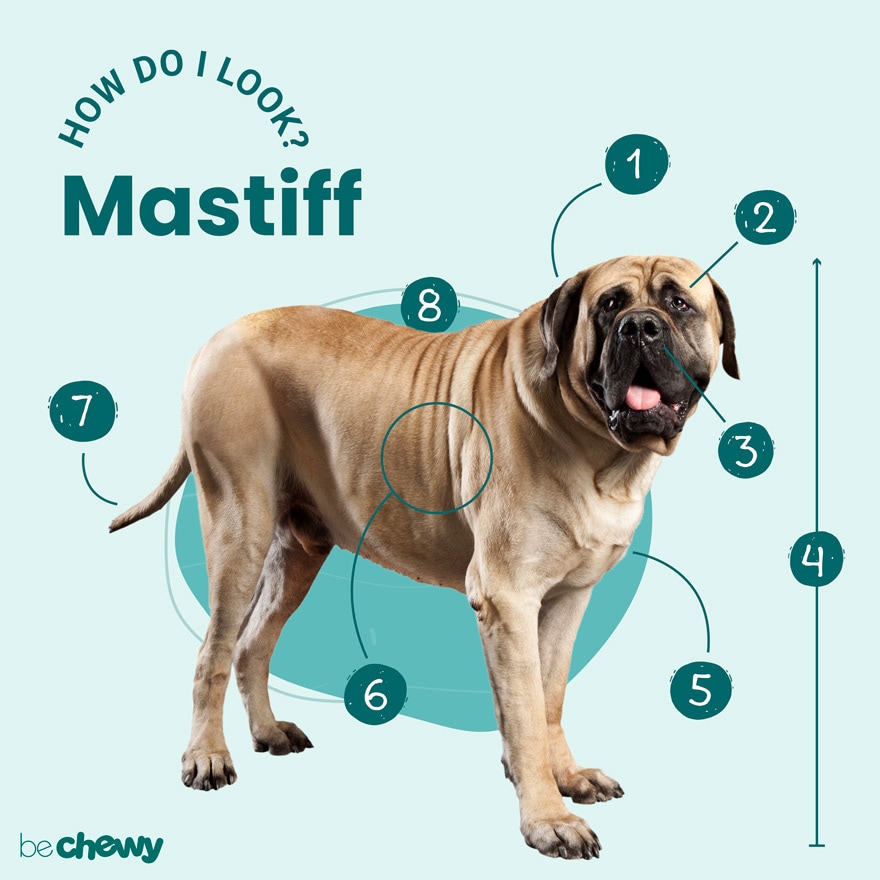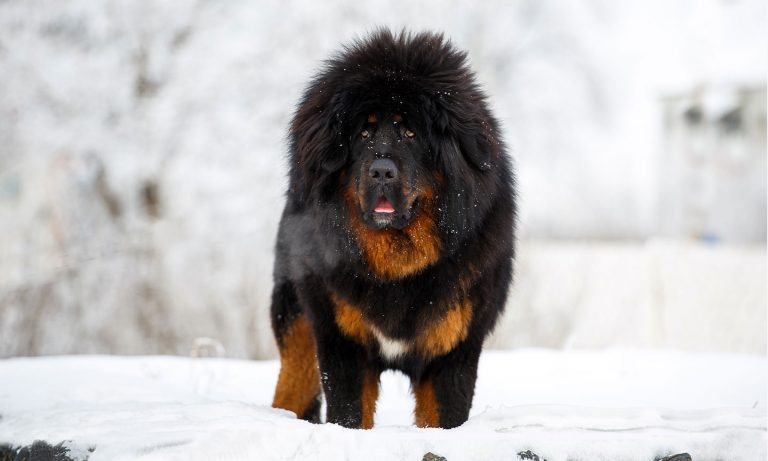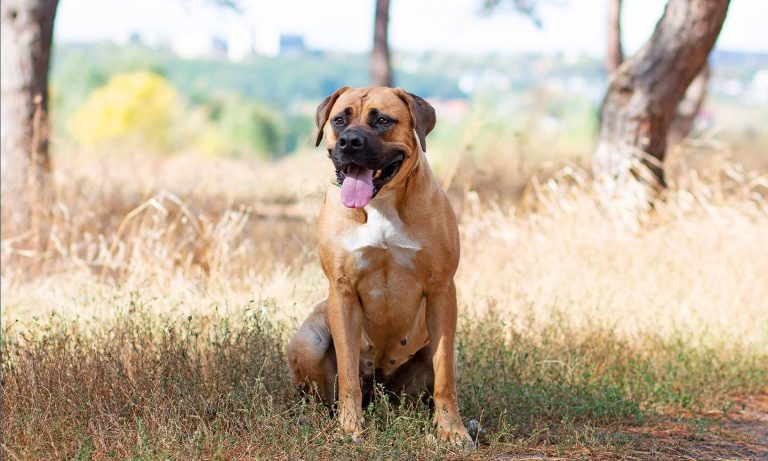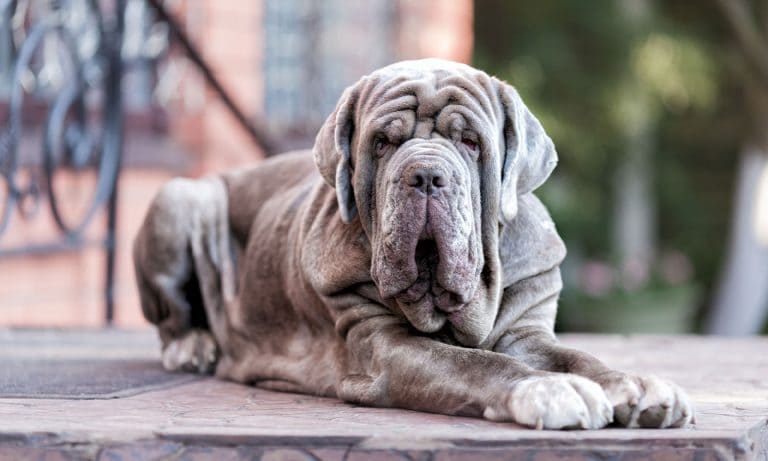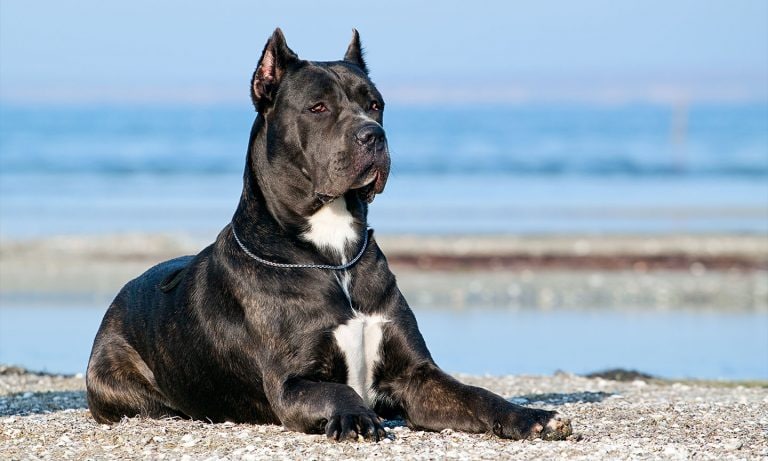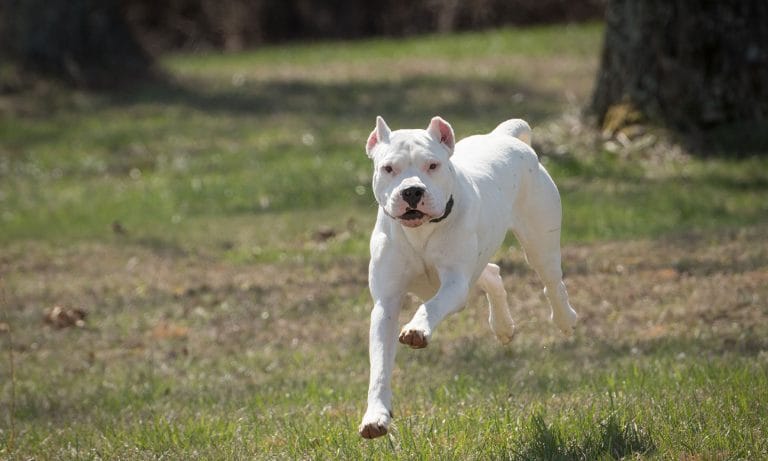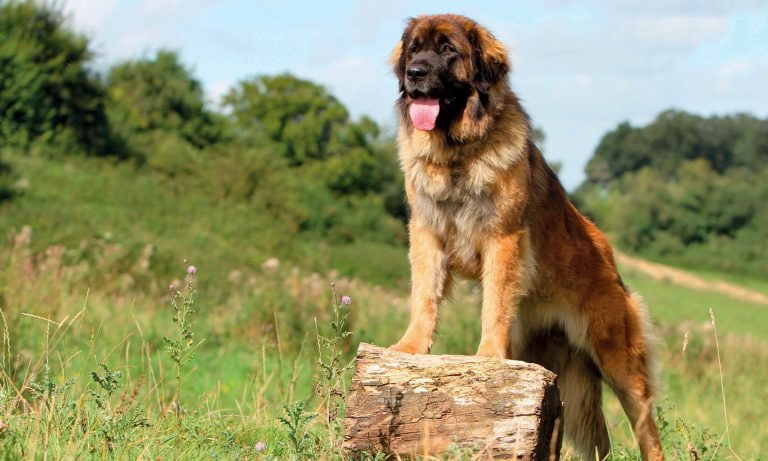This gentle giant lumbers along instead of trotting and leaves behind a wake of smeary drool. But if you’re a quick draw with a roll of paper towels and awed by the majesty that a Mastiff brings to the table, you may want to check out this special canine. Not for the faint of heart (or anyone with tiny biceps), a Mastiff puppy requires an all-in training approach—but in return, they’ll match your efforts with steadfast loyalty and love.
Breed Snapshot
Temperament:
UnruffledDignifiedProtectiveCoat Color:
FawnApricotBrindle
Best For
Mastiffs are gentle giants with a calm demeanor and moderate exercise needs. These steadfast companions they make loyal family pets for those with lots of time for training—and who aren't afraid of a little (ok, a lot) of drool.
Mastiff Temperament
Extreme loyalty and a courageous nature are the defining characteristics of a Mastiff’s temperament. While a Mastiff’s massive weight and height may put off some potential pet parents, this breed is quite friendly and makes an excellent family pet. If little ones are in your mix, know that with early and consistent training, having a Mastiff with kids is very doable since barking and biting aren’t common to this breed. Their kindly personality extends to four-legged pals as well, which means you can often add this colossal canine to homes with cats and other dogs.
A Mastiff has competency in spades, thanks to their innate intelligence and eagerness to please. As a quick learner, the Mastiff thrives on service, perhaps because this working breed has a long history of guarding and fighting alongside soldiers in battle.
It may seem counterintuitive that such a large animal might not have deep energy reserves, but this is actually the case with the Mastiff dog breed. Slow and steady wins the race here, so low-key pup parents are often the best pairing for this majestic creature.
How to Care for a Mastiff
Mastiff exercise needs are moderate and their coats are rather easy to brush—two reasons this most excellent dog breed may be the one for you. But keep in mind that this pup drools—a lot! So, you’ll always need at least one towel on hand for keeping their face (and your furniture) drool-free.
Mastiff Health
Mastiffs have a lifespan of 6 to 10 years. As with any dog breed, certain conditions are endemic. Potential pet parents should be aware of these health issues, so they can help their pup live the healthiest life possible.
- Hip and Elbow Dysplasia: These conditions, which may be genetic and occur when the joints form abnormally, can cause pain and lameness in a Mastiff. Weight management and medication may be recommended, as well as surgery in more severe cases.
- Progressive Retinal Atrophy (PRA): Multiple dog breeds may be affected by a family of inherited progressive degenerative eye diseases. One in this category is progressive retinal atrophy or PRA, and it strikes the retina, ultimately causing blindness. While there’s no cure for PRA, Mastiffs typically get used to the vision loss and have good quality of life.
- Heart Disease: There are several possible conditions that can affect a Mastiff’s heart including issues with the heart valves and dilated cardiomyopathy (DCM). Often one of the first signs will be a heart murmur. If your vet detects a heart murmur, they will likely refer you to a veterinary cardiologist for an echocardiogram (ultrasound of the heart) to determine the exact cause.
- Degenerative myelopathy (DM): This inherited neurologic condition is characterized by a progressive weakness of the rear limbs and ultimately may result in the dog being unable to stand or walk. There is no cure for DM but genetic screening testing is available so be sure to ask your breeder.
- Bloat or Gastric Dilatation-Volvulus (GDV): Large breeds with deep chests may be affected by this condition, which is suspected of having a genetic link as well as environmental causes such as eating too fast and having only one large meal a day. Bloat can be life-threatening as the stomach fills with air then twists. This is an emergency and you should take your pup to the vet immediately if they show any of the signs which include abdominal distension, retching/dry heaving, and restlessness. To help reduce the chances of getting bloat, feed your pup with a slow feeder bowl and feed them smaller meals throughout the day.
- Epilepsy: Mastiffs are prone to this potentially inherited seizure disorder which typically begins around 6 months to 5 years of age. Treatment is most often daily oral medication.
Mastiff History
The Mastiff enjoys a proud ancient lineage, though some confusion may erupt over mastiffs generally (as a type of dog) and Britain’s Old English Mastiff, which the American Kennel Club has simply named “Mastiff.” Dogs known as mastiffs have thrived for millennia in Greece, Rome, China and Egypt, with hieroglyphics of Mastiff likenesses showing up on monuments in the Nile region as early as 3000 BC. In fact, today’s Tibetan Mastiff and Neapolitan Mastiff breeds share a gene pool with mastiffs of yore.
Mastiff history is steeped in service as war dogs who fought invaders on many fronts. Caesar himself was apparently in awe of the breed when he ventured onto Britain’s shores in 55 BC. He brought Mastiffs home to Rome to be matched against gladiators and wild animals such as bears, bulls, lions and tigers. Mastiffs also worked as big game hunters, guard dogs and on the battlefield in an important campaign against the French in 1415.
Mastiffs came to the US in the late 1800s and were used to guard plantations. The pup joined the ranks of the American Kennel Club in 1885, making them one of the first recognized breeds in the AKC.
After World War II, the Mastiff nearly died out, with just 14 remaining in England. Fortunately for this noble animal, the Mastiff was brought back from the brink by dedicated breeders. Today, this canine’s combat boots have been hung up in favor of a cushier life in homes as a loyal companion.
Are you thinking about a Mastiff as a pet? Mastiff prices are about $2,500 to $3,500, depending on where you live. But for that price, you’ll likely get a pup who’s been screened for health issues and may come with pedigree papers. The AKC Marketplace is a good place to find reputable breeders for your Mastiff puppy. You can also check with Mastiff rescues, keep an eye out at local animal shelters, or search Chewy’s database of adoptable dogs in your area if you want to adopt a pup.
FAQs
Do Mastiffs shed?
Mastiff shedding is on the low side, comparatively, which is good news for homeowners (much less sweeping and vacuuming). Still, a Mastiff does shed once or twice a year when the seasons change, so brush more frequently, even daily, during these periods to whisk away dead fur.
Are Mastiffs good with kids?
Yes, Mastiffs are generally considered to be good with kids. Like any dog, they should be well-socialized and taught how to interact with children—and children should be taught how to play gently and respectfully with dogs as well.
What does Mastiff mean?
The word mastiff is influenced by an old French word mestif, meaning mongrel. As a type of dog, mastiff refers to large, powerful dogs once used for hunting.
What are the most popular Mastiff names?
The most popular Mastiff names are easy to spitball, in part because of this breed’s enormity (think Zeus, Titan, Bubba and Moose). Or, you could go in the other direction with a tongue-in-cheek moniker such as Tiny, Mouse or Bean. If you’re stumped and need some help, we’ve got great dog names ready for choosing.
What are the most common Mastiff mixes?
The most common Mastiff mixes are:
- Mastiff-Pit Bull mix (Pit Mastiff)
- Mastiff-Great Dane mix (Daniff)
- Mastiff-Labrador mix (Mastador)
- Mastiff-German Shepherd mix (Mastiff shepherd)
- Mastiff-Rottweiler mix
- Mastiff-Husky mix
Note: These are not purebred dogs but mixed breeds.
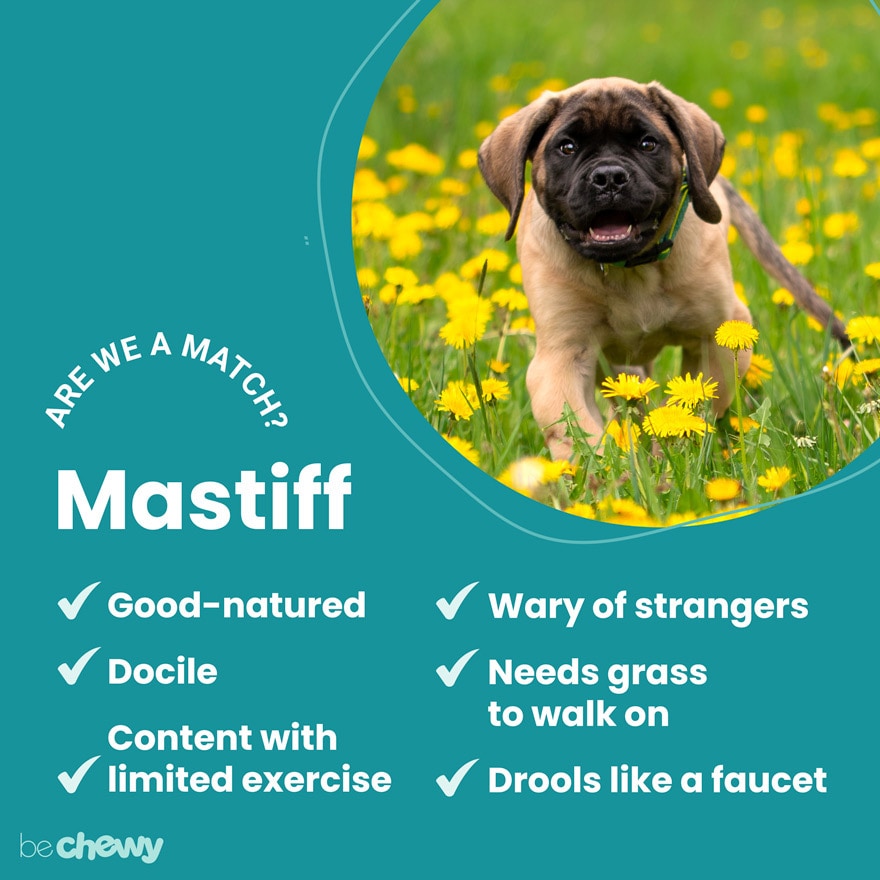
Top Takeaways
Mastiff facts are easy to digest: This huge dog has left a fierce past behind to become a fan-favorite for easy-going, drool-friendly family homes. Moderate exercise on dirt or grass and a gentle touch with a brush are all that’s needed for this big dog to flourish.
Expert input provided by Dr. Jerry Klein, DVM, American Kennel Club’s Chief Veterinary Officer and Mary R. Burch, PhD, Certified Applied Animal Behaviorist and AKC Family Dog Director
Breed characteristic ratings provided by veterinarian Dr. Sarah J. Wooten, DVM, CVJ, a veterinarian at Sheep Draw Veterinary Hospital in Greeley, Colorado; dog trainer and behavior consultant Irith Bloom, CPDT-KSA, CBCC-KA, CDBC, owner of The Sophisticated Dog, LLC, in Los Angeles; and certified animal behavior consultant Amy Shojai, CABC, in Sherman, Texas.
The health content was medically reviewed by Chewy vets.

Search for Adoptable Mastiffs Near You
Female Names
- Luna
- Bella
- Lucy
- Daisy
- Nala
- Maggie
- Stella
- Lola
- Bailey
- Athena
Male Names
- Moose
- Zeus
- Hank
- Duke
- Diesel
- Thor
- Bear
- Tank
- Odin
- Gus
Share:
